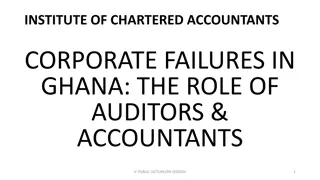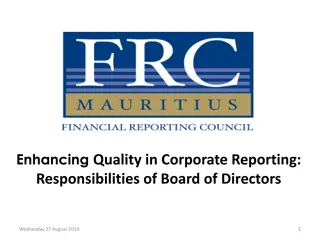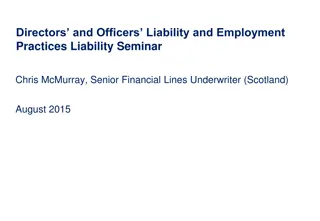Understanding the Role of a Board of Directors and Company Secretary in Corporate Governance
Strong corporate governance is crucial for business performance, as it involves the system of rules, practices, and processes that direct and control a company. In Uganda, the Companies Act of 2012 governs corporate governance, with a voluntary code for private companies and mandatory for new public companies. The OECD principles cover areas like shareholder rights and disclosure. Corporate governance can be approached in mandatory or voluntary forms, each with its standards and practices.
Download Presentation

Please find below an Image/Link to download the presentation.
The content on the website is provided AS IS for your information and personal use only. It may not be sold, licensed, or shared on other websites without obtaining consent from the author. Download presentation by click this link. If you encounter any issues during the download, it is possible that the publisher has removed the file from their server.
E N D
Presentation Transcript
THE ROLE OF A BOARD OF DIRECTORS AND A COMPANY SECRETARY IN ADVANCING CORPORATE GOVERNANCE IN A COMPANY By : Agaba Muhairwe & Co. Advocates A Presentation made to a client justifying the role of the Board and Company Secretary in advancing Corporate Governance in a Company. April 2018 www.agabamuhairwe.com 1
Strong corporate governance is a critical driver of business performance and not simply a compliance matter 2
CORPORATE GOVERNANCE Definition Corporate governance is defined as the system of rules, practices and processes by which a company is directed and controlled. This involves balancing the interests of a company s stakeholders such as the shareholders, management, customers, suppliers, financiers, government and the community. Importance of corporate governance Corporate governance provides the framework for attaining a company's objectives and it encompasses every sphere of management including ; Leadership strategy and culture, Structure performance and oversight, Risk, Management information and controls, Transparency and reporting 3
Legal Framework In Uganda, the 2012 Companies Act provides the primary framework for governance of companies and introduced a code of corporate governance that is voluntary for private companies and mandatory for new public companies. This code of Corporate Governance is enshrined under Table F of the Companies Act. 4
CORPORATE GOVERNANCE Cont. Furthermore, the Organisation for Economic Co-operation and Development (OECD) principles of corporate governance, 2004 cover five areas: The rights of shareholders, the equitable treatment of shareholders, the role of stakeholders, disclosure and transparency, the responsibility of the board Forms of corporate governance Corporate governance in Uganda is approached in two forms i.e. a) the mandatory form and b) the voluntary form. 5
CORPORATE GOVERNANCE Cont. a) The mandatory form, also called comply or else , is where corporate governance standards are enshrined in legal enforceable instruments such as Acts or Regulations e.g. Table F in the Companies Act of 2012, with legal penalties for non-compliance. b) The voluntary one also known as comply or explain includes guidelines that contain best practices on particular governance issues such as treatment of shareholders, transparency and accountability among others. The company has to adhere to these practices or explain why they won t adhere to them. 6
BOARD OF DIRECTORS The board of directors is the primary direct stakeholder influencing corporate governance in a company. Directors are appointed by the shareholders and they represent shareholders of the company. Duties of the Board The board is tasked with the responsibility of; making important decisions (such as corporate officer appointments, executive compensation and dividend policy) setting up company strategic aims and providing leadership to put them in effect supervising the management of the business and providing the shareholders with reports on their leadership. Providing constructive challenge to management to stimulate growth, discussion and debate In some instances, the board obligations stretch beyond administrative and financial control, when shareholder resolutions call for certain social or environmental concerns to be prioritized. 7
Board Composition Insufficient challenge in the board is often a key precursor of business failure Boards are often comprised of insiders and independent members. Insiders are major shareholders, founders and executives. Independent directors do not share the ties of the insiders, but they are chosen because of their experience managing or directing other large companies. Independents are considered helpful and more effective for governance because; they dilute the concentration of power and help align shareholder interest with those of the insiders. They ensure that business decisions are not dominated by any one director or CEO They are seen as unbiased and therefore well placed to guide the company operations. 8
Board Composition Cont. Furthermore, the board can also comprise of non executive directors. These are members of the board who are not part of the executive management team. They are not involved in the day to day management of the company but monitor executive activity of the company. They play an important role in terms of dispute resolution between the company and executive directors of the company, connecting the business to the outside world and ensuring that all audit requirements are satisfied by the company. Poor Board composition can is normally seen from; Lack of challenge Lack of Board committees Management habit of overriding controls Family members or friends of share holders holding Board positions without appropriate skills 9
BOARD OF DIRECTORS Cont. What makes a good board? Board members with solid judgement and diverse competences keep the company out of trouble and help to navigate difficult situations. Board members have to be well versed with the company s mission and vision. This helps them steer the company in the direction it intends to go. Board members have to be knowledgeable in areas of the industry that the company is in and the stage of business the company is in in order to be effective. Board members need to be motivated and hard working in promoting the company s interests. 10
BOARD OF DIRECTORS Cont. Role of Board in corporate governance To create a transparent set of rules and controls in which shareholders, directors and officers have aligned incentives. It is not enough for a company to merely be profitable; it also needs to demonstrate ethical behaviour, sound corporate governance practices and environmental awareness. 11
COMPANY SECRETARY Definition and role of company secretary A Company Secretary is a senior position in a private sector company or public sector organisation, normally in the form of a managerial position or above. Section 187 of the Companies Act of Uganda states that every company should have a secretary. It is the responsibility of the company secretary to ensure that the company and its directors operate within the law. The company secretary ensures that an organisation complies with relevant legislation and regulation, and keeps management and the board informed of their legal responsibilities. 13
FUNCTIONS OF THE COMPANY SECRETARY To ensure compliance of the provisions of Companies Act and rules made there-under and other statutes and bye-laws of the company. To ensure that business of the company is conducted in accordance with its objects as contained in its memorandum of association. To ensure that affairs of the company are managed in accordance with its objects contained in the articles of association and the provisions of the Companies Law. To prepare the agenda in consultation with the Chairman and the other documents for all the meetings of the board of directors. To arrange with and to call and hold meetings of the board and to prepare a correct record of proceedings. To attend the board meetings in order to ensure that the legal requirements are fulfilled, and provide such information as are necessary. To prepare, in consultation with the chairman, the agenda and other documents for the general meetings. 14
FUNCTIONS OF THE COMPANY SECRETARY To organise in consultation of chairman the annual and extraordinary general meetings of the company and to attend such meetings in order to ensure compliance with the legal requirements and to make correct record thereof. To prepare, approve, sign and seal agreements leases, legal forms, and other official documents on the company s behalf, when authorised by the broad of the directors or the executive responsible. To advise, in conjunctions with the company s solicitors, the chief executive or other executive, on legal matters, as required. To engage legal advisors and defend the rights of the company in Courts of Law. To have custody of the seal of the company. 15
FUNCTIONS OF THE COMPANY SECRETARY Filling of various documents/returns as required under the provisions of the Companies Act. Proper maintenance of books and registers of the company as required under the provisions of the Companies Act. To see whether legal requirements of the allotment, issuance and transfer of share certificates, mortgages and charges, have been complied with. To convene/arrange the meetings of directors, on their advise. To issue notice and agenda of board meetings to every director of the company. To carry on correspondence with the directors of the company on various matters. 16
FUNCTIONS OF THE COMPANY SECRETARY To record the minutes of the proceedings of the meetings of the directors. To implement the policies formulated by the directors. To deal with all correspondence between the company and the shareholders. To issue notices and agenda of the general meetings to the shareholders. To keep the record of the proceedings of all general meetings. To make arrangement for the payment of the dividend within prescribed period as provided under the provisions of the Companies Act 17
COMPANY SECRETARY Cont. Qualities of a company secretary Before appointing a company secretary, a company should look for the following qualities in a potential candidate: Have complete knowledge and experience of company procedures Be systematic, well organized and impartial Have knowledge of roles and responsibilities he/she has towards the company Be aware of the recent changes in the industry Be able to advise on ethical governance practices and corporate compliances 18
COMPANY SECRETARY Cont. In Uganda, section 190 provides the qualifications of a company secretary as; an advocate of the High Court; a person who, by virtue of his or her holding or having held any other position or his or her being a member of any other body, appears to the directors to be capable of discharging those functions; is a member of or is qualified to be a member of the Institute of Chartered Public Accountants in Uganda or the Institute of Chartered Secretaries and Administrators. 19
COMPANY SECRETARY Cont. It is important to note that a law firm can be a company secretary. This is effective because the work load and responsibility is shared among a group of lawyers. It benefits the company because the team at the law firm work together to ensure that the company is served excellently. A law firm promotes good corporate governance because it ensures that there are more streamlined systems e.g. Ensuring that all company documentation are drafted, filed and registered on time. 20
CONCLUSION It is important to note that there must be synergy between the shareholders, board of directors and company secretary because this ensures the smooth running of a company. They also have to involve everyone in the company in corporate governance so that there is growth and sustainability of the company. The real mechanism for corporate governance is the involvement of the owners. Louis Gerstner Board Chairman & CEO of IBM 1993-2002. 21























